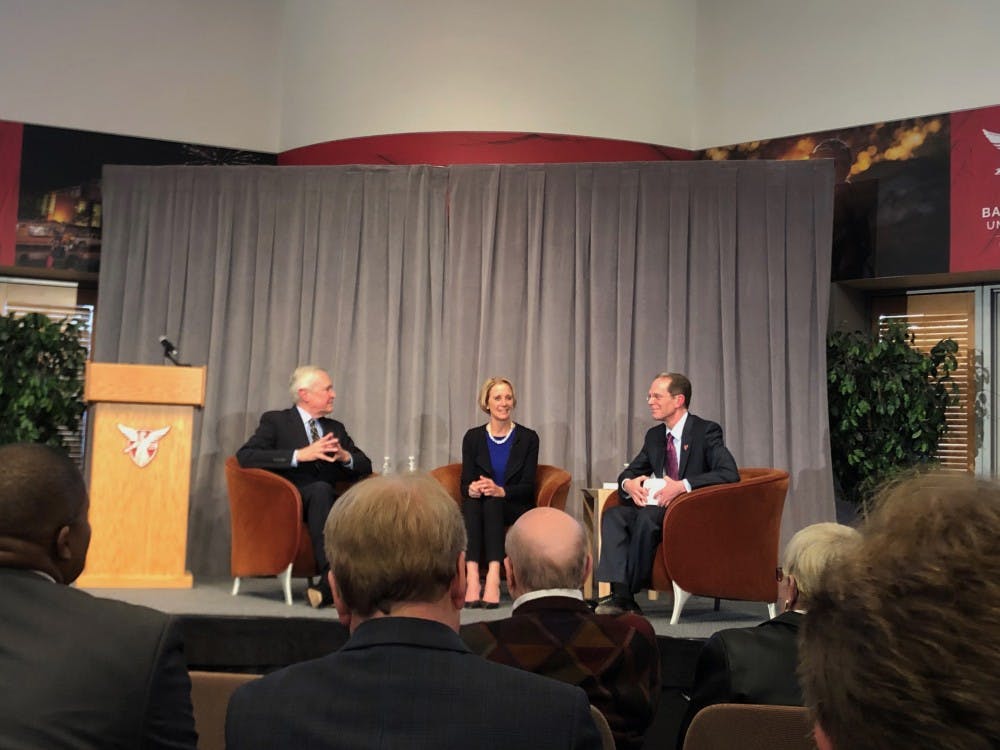Sioux Falls, South Dakota; Burlington, Vermont; Erie, Pennsylvania — all of these cities across the United States have different cultures, climates, people and ways of doing things. What they all have in common, though, is a visit from James and Deborah Fallows.
Indiana Humanities and New America Indianapolis presented the “Our Towns: Indiana Tour” March 18 at the Alumni Center. The event began Indiana Humanities’ two-year plan titled “INseparable,” made to see how communities relate to each other with President Geoffrey Mearns as the moderator.
The Fallows wrote the book “Our Towns: A 100,000-Mile Journey Into the Heart of America” about communities they traveled to around the country over the past several years and what makes them unique but also similar. They chose cities facing some kind of struggle and not traditionally covered in media.
From their initial impressions of Muncie, they agreed the city fosters a positive attitude in comparison to other places they’ve been.
“There wasn’t a ‘Well, we don’t do that here,’” Deborah said. “A word I heard several times — which was surprising — was ‘We are blessed.’”
The Fallows addressed issues like the importance of a vital downtown in cities, how historic trends such as historic downtown architecture and how younger people are beginning to move to downtown areas impact the “spark” of the city as a whole. Deborah talked about the value public art brings to not just downtown areas but cities as a whole.
“I think that the public art — sometimes it was bronze statues sometimes it was murals — really gave people an excuse to be there and to be with the other people in the town, which build this kind of immeasurable sense of the core of the downtown and why it was important,” Deborah said.
Education is a concern in all communities, and Deborah said she was surprised by San Bernardino, California’s tracking program to “make school more relevant to the kids.” James was also surprised at the importance of community colleges in areas and how it gives people who need opportunities to learn, that chance.
The importance of balancing and supporting local businesses versus attracting national chains all depends on the community and culture of the community. Deborah told a story about going to a marijuana dispensary in Oregon, and how that works there because it is legal but would not work in Muncie.
“What works in some places doesn’t work in others,” James said. “The national chains are with us and ever will be, but the more happening a town was, the more they tried to have their local brand and people were liking that.”
Muncie sticks out to the Fallows among other midwest cities since there is a relatively low amount of immigrants in the city. James’ observation was the more immigrants there were in cities he and Deborah visited, the less threatened the community was by them. They said immigration into cities helps its residents learn more about and accept other cultures and become closer as a whole.
The Fallows ended by talking about how raising taxes — while not desired by almost all cities they visited — was accepted when the money went towards something important to the community, and how it almost always paid off. They also talked about the importance of arts to a community and the attributes of a good mayor.
“Many cities are set up to allow a mayor to reach reasonable compromises between people of different points of view and to make long term plans,” James said. “A mayor who is willing to say ‘Here are the challenges of the community. What’s a way we can make long term plans that have reasonable compromises?’ I will vote for such person, or I will vote for all of them if there are several on the ballot.”
On March 19, “Our Towns: Indiana Tour” will visit Indianapolis, on March 20 visit Fort Wayne, Indiana and conclude on March 21 in Angola, Indiana.
Contact Demi Lawrence with comments at dnlawrence@bsu.edu.





